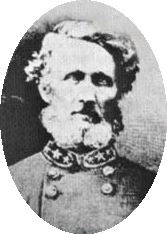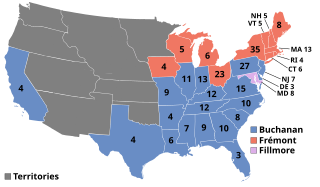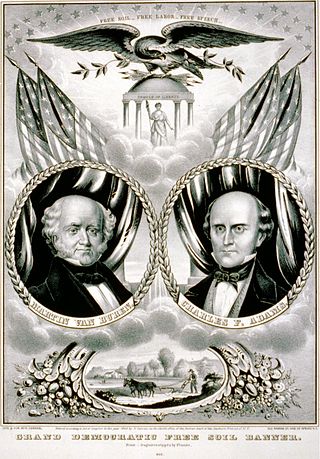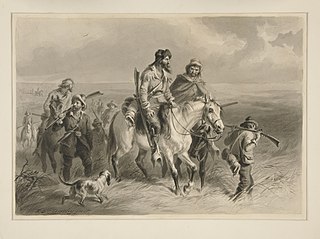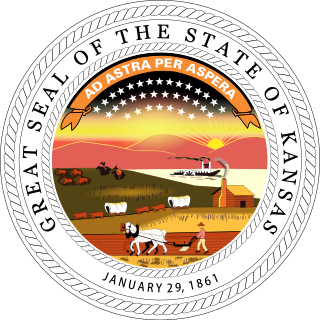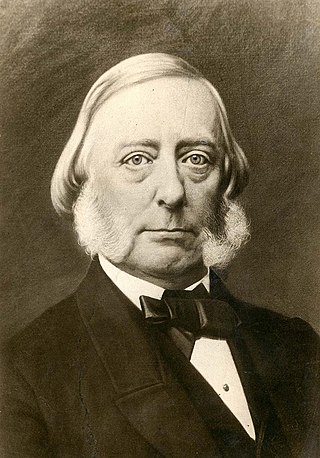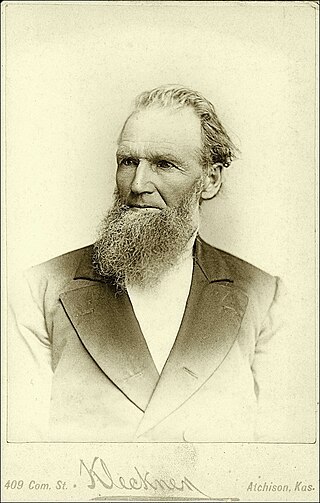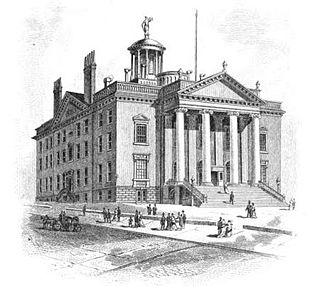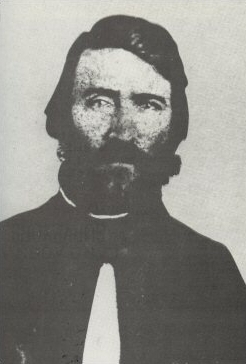Territorial legislature election results
Territorial Council results
| ||||||||||
All 13 seats to the Kansas Territory Council | ||||||||||
|---|---|---|---|---|---|---|---|---|---|---|
| ||||||||||
 | ||||
| Faction | March 30 elections | May 22 elections | Total seats | |
|---|---|---|---|---|
| Pro-slavery | 10 | 0 | 10 | |
| Free-State | 1 | 2 | 3 [lower-roman 1] | |
| Source:Andreas, Alfred T. (1883). History of the State of Kansas. Chicago: A. T. Andreas. pp. 95–101. | ||||
March 30 election results
| Faction | Candidates | Votes | % | |
|---|---|---|---|---|
| Pro-slavery | Thomas Johnson Edward Chapman | 900 [lower-roman 2] | 79.08 | |
| Free-State | Joel K. Goodwin Samuel Newitt Wood | 273 | 23.08 | |
| – | "Scattering" votes | 10 | 0.84 | |
| Total votes cast | 1,183 | |||
| Illegally cast [3] | 827 | 69.91 | ||
| Pro-slavery gain [4] | ||||
| Faction | Candidate | Votes | % | |
|---|---|---|---|---|
| Pro-slavery | A. McDonald | 318 | 96.36 | |
| Free-State | J. A. Wakefield | 12 | 3.64 | |
| Total votes cast | 330 | |||
| Illegally cast [3] | 316 | 95.76 | ||
| Results abrogated; new election ordered [5] | ||||
| Faction | Candidate | Votes | % | |
|---|---|---|---|---|
| Pro-slavery | H. S. Strickler | 598 | 92.71 | |
| Free-State | William F. Johnson | 23 | 3.56 | |
| Free-State | — Rice | 17 | 2.64 | |
| Free-State | A. McDonald | 4 | 0.62 | |
| – | "Scattering" votes | 3 | 0.46 | |
| Total votes cast | 645 [lower-roman 3] | |||
| Illegally cast [3] | 547 | 84.81 | ||
| Results abrogated; new election ordered [5] | ||||
| Faction | Candidates | Votes | % | |
|---|---|---|---|---|
| Pro-slavery | A. M. Coffee David Lykins | 680 | 79.53 | |
| Free-State | M. G. Morris James P. Fox | 158 | 18.47 | |
| – | "Scattering" votes | 17 | 1.99 | |
| Total votes cast | 855 | |||
| Illegally cast [3] | 630 | 73.68 | ||
| Pro-slavery gain [4] | ||||
| Faction | Candidate | Votes | % | |
|---|---|---|---|---|
| Pro-slavery | William Barbee | 343 | 100 | |
| Total votes cast | 343 | |||
| Illegally cast [3] | 243 | 70.84 | ||
| Pro-slavery gain [4] | ||||
| Faction | Candidate | Votes | % | |
|---|---|---|---|---|
| Free-State | Martin F. Conway | 139 [lower-roman 4] | 66.51 | |
| Pro-slavery | John Donaldson | 68 [lower-roman 4] | 32.54 | |
| – | "Scattering" votes | 2 | 0.96 | |
| Total votes cast (Election Districts 9-12) | 540 [lower-roman 5] | |||
| Total votes cast (Election Districts 9-10, 12) | 209 [lower-roman 6] | |||
| Illegally cast (Election Districts 9-12) | 345 [lower-roman 7] | 63.89 | ||
| Illegally cast (Election Districts 9-10, 12) | 21 [lower-roman 8] | 10.04 | ||
| Free-State gain [4] | ||||
| Faction | Candidate | Votes | % | |
|---|---|---|---|---|
| Pro-slavery | John W. Foreman | 478 | 100 | |
| Total votes cast | 478 | |||
| Illegally cast [3] | 207 | 43.30 | ||
| Pro-slavery gain [4] | ||||
| Faction | Candidate | Votes | % | |
|---|---|---|---|---|
| Pro-slavery | W. P. Richardson | 234 | 77.48 | |
| Free-State | John W. Whitehead | 68 | 22.52 | |
| Total votes cast | 302 | |||
| Illegally cast [3] | 166 | 55.00 | ||
| Pro-slavery gain [4] | ||||
| Faction | Candidate | Votes | % | |
|---|---|---|---|---|
| Pro-slavery | D. A. M. Grover | 411 | 99.76 | |
| – | "Scattering" votes | 1 | 0.24 | |
| Total votes cast | 412 | |||
| Illegally cast [3] | 332 | 80.58 | ||
| Pro-slavery gain [4] | ||||
| Faction | Candidates | Votes | % | |
|---|---|---|---|---|
| Pro-slavery | R. R. Rees J. J. Eastin | 1,129 | 94.48 | |
| Free-State | B. H. Twombly A. J. Whitney | 66 [lower-roman 9] | 5.52 | |
| Total votes cast | 1,195 [lower-roman 10] | |||
| Illegally cast [3] | 1,044 [lower-roman 11] | 86.57 | ||
| Pro-slavery gain [4] | ||||
May 22 election results
| Faction | Candidate | Votes | % | |
|---|---|---|---|---|
| Free-State | J. A. Wakefield | 127 | 100 | |
| Total votes cast | 127 | |||
| Free-State gain [4] | ||||
| Faction | Candidate | Votes | % | |
|---|---|---|---|---|
| Free-State | Jesse D. Wood | 214 | 86.64 | |
| Free-State | C. H. Washington | 33 | 13.36 | |
| – | "Scattering" votes | 14 | 0.84 | |
| Total votes cast | 247 | |||
| Free-State gain [4] | ||||
Territorial House results
| ||||||||||
All 26 seats to the Kansas Territory House of Representatives | ||||||||||
|---|---|---|---|---|---|---|---|---|---|---|
| ||||||||||
 | ||||
| Faction | March 30 elections | May 22 elections | Total seats | |
|---|---|---|---|---|
| Pro-slavery | 15 | 3 | 18 | |
| Free-State | 2 | 6 | 8 [lower-roman 12] | |
| Source:Andreas, Alfred T. (1883). History of the State of Kansas. Chicago: A. T. Andreas. pp. 95–101. | ||||
March 30 election results
| Faction | Candidate | Votes | % | |
|---|---|---|---|---|
| Pro-slavery | A. S. Johnson | 120 | 84.51 | |
| Free-State | A. F. Powell | 19 | 13.38 | |
| – | "Scattering" votes | 3 | 2.11 | |
| Total votes cast | 142 [lower-roman 13] | |||
| Illegally cast [8] | 65 [lower-roman 14] | 45.77 | ||
| Pro-slavery gain [4] | ||||
| Faction | Candidates | Votes | % | |
|---|---|---|---|---|
| Pro-slavery | Jatues Whitlock J. M. Banks A. B. Wade | 781 | 74.81 | |
| Free-State | John Hutchison E. D. Ladd P. P. Fowler | 253 | 24.23 | |
| – | "Scattering" votes | 10 | 0.96 | |
| Total votes cast | 1,044 [lower-roman 15] | |||
| Illegally cast [8] | 802 [lower-roman 16] | 76.82 | ||
| Results abrogated; new election ordered [5] | ||||
| Faction | Candidates | Votes | % | |
|---|---|---|---|---|
| Pro-slavery | G. W. Ward O. H. Brown | 318 | 93.26 | |
| Free-State | Isaac Davis E. G. Macy | 12 | 3.52 | |
| – | "Scattering" votes | 11 | 3.23 | |
| Total votes cast | 341 | |||
| Illegally cast [8] | 316 | 31.09 | ||
| Results abrogated; new election ordered [5] | ||||
| Faction | Candidate | Votes | % | |
|---|---|---|---|---|
| Pro-slavery | D. L. Croysdale | 366 | 98.65 | |
| Free-State | Cyrus K. Holliday | 4 | 1.08 | |
| – | "Scattering" votes | 1 | 0.27 | |
| Total votes cast | 371 [lower-roman 17] | |||
| Illegally cast [8] | 338 [lower-roman 18] | 91.11 | ||
| Results abrogated; new election ordered [5] | ||||
| Faction | Candidates | Votes | % | |
|---|---|---|---|---|
| Free-State | A. J. Baker | 25 [lower-roman 19] | 64.10 | |
| Pro-slavery | M. W. McGee | 12 [lower-roman 19] | 30.77 | |
| Free-State | H. Rice | 0 [lower-roman 19] | 0 | |
| – | "Scattering" votes | 2 | 5.13 | |
| Total votes cast (Election Districts 7–8) | 273 [lower-roman 20] | |||
| Total votes cast (Election District 8 only) | 39 [lower-roman 21] | |||
| Illegally cast (Election Districts 7–8) [8] | 209 [lower-roman 22] | 76.56 | ||
| Free-State gain [4] | ||||
| Faction | Candidates | Votes | % | |
|---|---|---|---|---|
| Pro-slavery | Joseph C. Anderson S. A. Williams | 315 | 90.0 | |
| Free-State | John Hamilton William Margraves | 35 | 10.0 | |
| Total votes cast | 350 | |||
| Illegally cast [8] | 250 | 71.43 | ||
| Pro-slavery gain [4] | ||||
| Faction | Candidates | Votes | % | |
|---|---|---|---|---|
| Pro-slavery | W. A. Haskall A. Wilkinson H. Younger Samuel Scott | 684 | 80.19 | |
| Free-State | John Serpell Adam Pore S. H. Houser William Jennings | 152 | 17.82 | |
| – | "Scattering" votes | 17 | 1.99 | |
| Total votes cast | 853 [lower-roman 23] | |||
| Illegally cast [8] | 630 [lower-roman 24] | |||
| Pro-slavery gain [4] | ||||
| Faction | Candidate | Votes | % | |
|---|---|---|---|---|
| Free-State | S. D. Houston | 120 | 71.86 | |
| Pro-slavery | Russell Garrett | 41 | 24.55 | |
| – | "Scattering" votes | 6 | 3.59 | |
| Total votes cast | 167 | |||
| Illegally cast [8] | 10 [lower-roman 25] | 5.99 | ||
| Free-State gain [4] | ||||
| Faction | Candidate | Votes | % | |
|---|---|---|---|---|
| Pro-slavery | J. Marshall | 344 | 91.98 | |
| Free-State | H. McCartney | 26 | 6.95 | |
| – | "Scattering" votes | 4 | 1.07 | |
| Total votes cast | 374 [lower-roman 26] | |||
| Illegally cast [8] | 321 | 85.83 | ||
| Pro-slavery gain [4] | ||||
| Faction | Candidate | Votes | % | |
|---|---|---|---|---|
| Pro-slavery | William H. Tibbs | 237 | 98.75 | |
| Free-State | C. Hard | 3 | 1.25 | |
| Total votes cast | 240 [lower-roman 27] | |||
| Illegally cast [8] | 230 [lower-roman 28] | 95.83 | ||
| Pro-slavery gain [4] | ||||
| Faction | Candidates | Votes | % | |
|---|---|---|---|---|
| Pro-slavery | J. H. Stringfellow R. L. Kirk | 420 | 87.5 | |
| Free-State | G. A. Cutler John Landis | 54 | 11.25 | |
| – | "Scattering" votes | 6 | 1.25 | |
| Total votes cast | 480 | |||
| Illegally cast [2] | – | – | ||
| Pro-slavery gain [4] | ||||
| Faction | Candidates | Votes | % | |
|---|---|---|---|---|
| Pro-slavery | J. P. Blair T. W. Watterson | 258 | 99.23 | |
| Free-State | Joel Ryan John Fee | 2 | 0.77 | |
| Total votes cast | 260 | |||
| Illegally cast [2] | – | – | ||
| Pro-slavery gain [4] | ||||
| Faction | Candidates | Votes | % | |
|---|---|---|---|---|
| Pro-slavery | H. B. C. Harris J. Weddell | 412 | 100 | |
| Total votes cast | 412 | |||
| Illegally cast [2] | – | – | ||
| Pro-slavery gain [4] | ||||
| Faction | Candidates | Votes | % | |
|---|---|---|---|---|
| Pro-slavery | H. B. McMeeken Archy Payne W. G. Mathias | 897 | 93.83 | |
| Free-State | Felix G. Braden Samuel France F. Browning | 59 | 6.17 | |
| Total votes cast | 956 | |||
| Illegally cast [2] [lower-roman 29] | 906 | 94.77 | ||
| Results abrogated; new election ordered [5] | ||||
May 22 election results
| Faction | Candidates | Votes | % | |
|---|---|---|---|---|
| Free-State | John Hutchison Erastus. D. Ladd Philip P. Fowler | 288 | 94.12 | |
| – | "Scattering" votes | 18 | 5.88 | |
| Total votes cast | 306 | |||
| Free-State gain [4] | ||||
| Faction | Candidates | Votes | % | |
|---|---|---|---|---|
| Free-State | Augustus Wattles William Jessee | 127 | 100 | |
| Total votes cast | 127 | |||
| Free-State gain [4] | ||||
| Faction | Candidate | Votes | % | |
|---|---|---|---|---|
| Free-State | Cyrus K. Holliday | 148 | 99.33 | |
| – | "Scattering" votes | 1 | 0.67 | |
| Total votes cast | 149 | |||
| Free-State gain [4] | ||||
| Faction | Candidates | Votes | % | |
|---|---|---|---|---|
| Pro-slavery | H. B. McMeeken Archy Payne W. G. Mathias | 700 | 97.90 | |
| – | "Scattering" votes | 15 | 2.10 | |
| Total votes cast | 715 | |||
| Pro-slavery gain [4] | ||||
Outcome
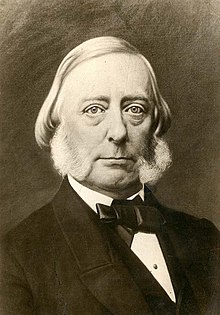
Initial returns suggested that voters had chosen 13 pro-slavery councilmen and 25 pro-slavery representatives. Free-state settlers immediately cried foul, citing demonstrable voting irregularities, and so the governor of Kansas Territory, Andrew Horatio Reeder, scrutinized the results: On April 6, 1855, he declared Martin F. Conway the winner of the sixth district, and he also called for new elections for Council Districts 2–3 and House Districts 2–4, and 14. These elections, held on May 22, were all won by Free-Staters with the exception of the House District 14 race. After the governor granted election certificates, the Council was consequently left with 10 pro-slavery and 3 Free-state members, whereas the House was left with 18 pro-slavery and 8 Free-state members. [9] However, when the territorial legislature met for the first time on July 2, 1855, it expelled all the Free-state men who had been elected in May. The remaining Free-State representative, S. D. Houston, would resign in protest on July 23. [10] [lower-roman 30] The legislature's decision to eject most of its Free-State members led to many in Kansas denouncing it as the "Bogus Legislature". [11]
On March 19, 1856, the US House of Representatives tasked a special committee, comprising William A. Howard (O-Michigan), John Sherman (O-Ohio), and Mordecai Oliver (O-Missouri), [12] with investigating "the troubles in the Territory of Kansas." [13] Their report, "Report of the Special Committee Appointed to Investigate the Troubles in Kansas", was published later in 1856. In this document, the committee's majority contended that "each election in the Territory, held under the organic or alleged Territorial law, has been carried by organized invasion from the State of Missouri by which the people of the Territory have been prevented from exercising the rights secured to them by the organic law." [14] The majority also argued that, in their opinion, "the alleged Territorial legislature was an illegally constituted body, and had no power to pass valid laws, and their enactments are therefore null and void." [14] Finally, the committee majority argued that "in the present condition of the Territory a fair election cannot be held without a new census, a stringent and well-guarded election law, the selection of impartial judges, and the presence of United States troops at every place of election." [14]
